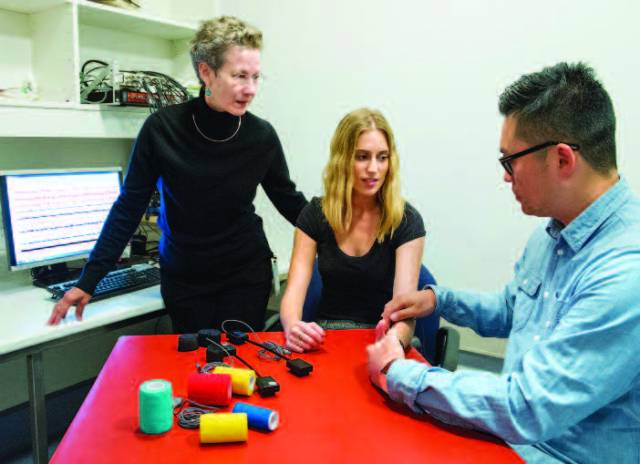
Playing the game

The Royal Freemasons’ Benevolent Institution (RFBI) has been providing practical help to those in need since its formation in 1880.
Initially formed to provide assistance to masons and their families, the organisation underwent a major policy change in 1964 to enable assistance to be expanded to the community at large regardless of masonic affiliation. The expanded policy has been continued by way of support to Neuroscience Research Australia’s (NeuRA) research in stroke rehabilitation. The support will consist of three Postgraduate (PhD) Scholarship candidates for three years commencing in 2015. The scholarships are estimated to cost in the order of $220,000.
The RFBI’s sponsorship was formally announced on Thursday 24 July at a function at NeuRA in Randwick, Sydney. The evening acknowledged Postgraduate Scholarship recipients which NeuRA awards to the next generation of Australian medical researchers. The guest of honour who presented the scholarship awards was the NSW Chief Scientist and Engineer Professor Mary O’Kane.
The facts on stroke are disturbing:
- It is the second largest cause of death and disability in Australia after coronary heart disease and kills more women than breast cancer and more men than prostate cancer.
- There are over 420,000 Australians currently living with the effects of stroke. Impaired movement ability is the most common outcome after stroke.
- More than 60,000 Australians suffer a stroke every year (one every 10 minutes) and this number will only increase with the ageing population and the growing epidemics of obesity, diabetes and physical inactivity.
Stroke can affect young as well as older people. Some stroke victims aged under 45 years are predisposed to stroke via their genetic makeup while others have strokes following recreational use of drugs and excessive alcohol consumption.
Rehabilitation following a stroke is slow and extremely tedious and in many cases the results are minimal. NeuRA is working to understand how a stroke alters the body’s capacity to produce functional movements and how this changes with recovery and rehabilitation. Dr Penelope McNulty is leading NeuRA’s research on stroke rehabilitation and has developed a new rehabilitation tool using the Nintendo Wii game system. The initial results have had some remarkable outcomes for participants aged from 18 to 83 years and from 1 month to 21 years poststroke.
Participants take part in a 14 day program of Wii-based Movement Therapy which makes therapy fun to the point where they want to do their exercises, something which does not often happen with existing rehabilitation exercise programs. At the six month follow up, many patients have continued therapy activities and Dr McNulty has seen a sustained improvement in the participants’ overall movement and confidence. This has significant benefits for the independence of stroke survivors in daily tasks such as walking, bathing and getting dressed.
Dr McNulty has completed Phase I and II trials; the planning phase for Phase III (a multicentre international randomised control trial) is underway.
‘We still need to understand the neurophysiological mechanisms that are the basis for the program’s success … this knowledge will allow us to further individually tailor this versatile program no matter what the needs and disabilities of each patient,’ she said.
‘The program has potential for wider rehabilitation use for patients who have lost muscle function. Other areas where Wii-based Movement Therapy may be beneficial include Parkinson’s disease, spinal cord injury and children with cerebral palsy,’ Dr McNulty mentioned.
A summary of the three PhD student research projects which the Royal Freemasons’ Benevolent Institution will be supporting from 2015 are:
Implementation of the novel poststroke rehabilitation protocol Wii-based Movement Therapy (developed by Dr McNulty) in different settings. This study will pave the way for translation into routine clinical practice within health facilities across Australia and internationally. Wiibased Movement Therapy utilises the standard Wii Sports video games as a tool for rehabilitation. The research will examine the outcomes after a 14-day protocol of Wii-based Movement Therapy in the acute (in–hospital) setting, in the community setting, and with longer term follow-up. Dr McNulty has shown that this therapy promotes improved functional use of the stroke-affected arm and hand regardless of age, time poststroke and level of disability. This study will challenge the versatility of the program in different situations so that once Wii-based Movement Therapy has been translated into routine clinical practice it can be tailored to help almost any stroke survivor.
Another of the PhD studies will be looking into the changes in cardiovascular and motor performance after stroke promoted by Wii-based Movement Therapy and will follow up Dr McNulty’s recent findings that this novel rehabilitation program improves cardiovascular fitness after stroke.
The third and final PhD student will research the Sensorimotor neurophysiology of stroke where they will examine the changes in the machinery of sensation and movement after stroke and how these change with rehabilitation. This research will involve microneurography to make single cell recordings in awake stroke survivors to determine whether the loss of touch and movement sensation is due to the stroke lesion in the brain, the secondary changes in the periphery (due to muscle wastage from disuse of the upperlimb), or changes in the connectivity within the spinal cord. This PhD will address the evidence gaps where there is an astonishing lack of detailed neurophysiology after stroke.
Additional research programs sponsored by the RFBI include a $90,000 Grant in 1993 to Professor A Braur, Concord Hospital and a grant of $100,000 in 2011 to the Griffith University in support of research into the treatment of dementia. The RFBI is proud to sponsor research into these debilitating medical problems.
Article extracted from Freemason magazine, September 2014, pages 12 and 13.


